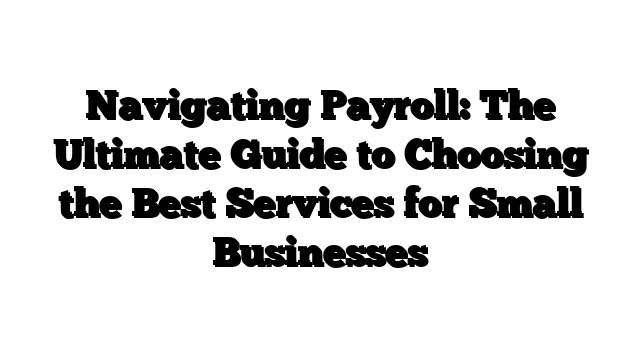Payroll is one of small business owners’ most complex and challenging tasks. It requires a solid understanding of laws, regulations, and practices.
Payroll regulations are constantly changing. That makes it crucial for business owners to stay informed about changes through subscriptions, seminars, or webinars and seek professional advice.
Choosing the Right Payroll Software
Whether you want to automate your internal compensation processes, reduce the risk of errors in payroll calculations, or file tax documents like W-2s and 1099s, finding the right payroll software for your business is essential. You should also consider the integration capabilities of your chosen system and if it is compatible with any other tools your company relies on, such as scheduling software for hourly workers or employee benefit management systems.
Finally, consider your budget when choosing a payroll provider. Finding a solution within your price range that offers the features you need, such as direct deposit and payroll taxes, is essential. It’s also a good idea to check out online reviews for your top choices to ensure they have what it takes to meet your specific needs.
The complexity of payroll regulations is ever-changing, and you must choose a service provider that stays updated on new laws and rules so that your company can avoid costly penalties. Most online payroll tools offer automatic tax calculations and help you navigate year-end tax filing services.
Choosing the Right Payroll Service Provider
Choosing the best payroll services for small businesses in Canada is crucial. There are numerous options, ranging from bare-bones solutions to fully integrated products with various features. To decide on what to choose, first determine your requirements and set a budget. From there, you can narrow your options to providers in your price range with the necessary features. Once you have a list of “must haves,” identify other features that would benefit your business, such as mobile access, reporting tools, and integration capabilities.
Additionally, consider the availability of support. If you’re going to spend money on payroll services, be sure that your providers offer a wide range of support resources to help guide you through any issues that may arise. It’s also important to consider if you want to work with U.S.-based experts that provide 24/7 support. This feature can save you time and money if you need to reach a live person after traditional business hours. In addition, it can reduce the risk of miscommunication and ensure compliance with government regulations and tax obligations.
Year-End Payroll Process
The year-end payroll process is complex and involves several tasks that must be completed before the end of one calendar year and the beginning of another. These tasks include reconciling the company’s active payroll with bank statements, accounts payable, and third-party payments. Ensuring all terminations are recorded and that the list of terminated employees is accurate is also essential. It is necessary to close the payroll year correctly so the business can begin the next tax season on a clean slate and avoid costly mistakes.
The first step in a successful payroll year-end process is to prepare a list of the required tasks that must be completed. Include the deadlines for each task and assign responsibility for completing each activity. Then, prioritize the tasks and create a schedule.
Some essential payroll dates are federal and state income tax due dates, quarterly and annual tax reporting due dates, and other compliance deadlines. Check the IRS and local government websites for updated information on these dates.
Payroll Compliance
Payroll compliance is a complicated process, especially for businesses that operate in multiple jurisdictions. Local, state, and federal laws govern the minimum wage, overtime pay, child labor standards, recordkeeping, tax withholding, and other essential aspects of payroll management. Non-compliance can result in expensive fines and other penalties.
A payroll service can ensure that your business complies with all payroll-related laws. They can keep track of payment deadlines and filing rules, prevent errors from occurring in payroll calculations, and file tax forms on your behalf. Using a payroll service provider can also save your business money, as the average company that outsources its payroll processes saves 18% over companies that handle their payroll functions.
Accurately determining employee exemption status under the FLSA can take time for payroll compliance. Please do so correctly to avoid costly mistakes that could cause your business to become non-compliant. It is crucial to ensure that employees are classified correctly to avoid any legal problems and penalties. A payroll service can be beneficial in this regard.
Payroll During a Crisis
During a crisis, companies must balance employee concerns about financial security with the need to comply with business and regulatory requirements. During a crisis, companies can navigate payroll by developing a contingency plan, being transparent with employees, maintaining accurate records, and seeking professional guidance.
Many small business owners need help finding a payroll service provider that meets their needs and budget. To narrow your options, consider your number of employees, how much you will spend, and if you need additional features beyond basic processing.
Some payroll services have a flat fee, while others have a more complicated pricing structure with a base price and additional charges for various features. It’s also essential to evaluate the nitty-gritty details, such as how many payroll runs are included in the monthly fee and whether you can change or adjust employee information, wages, or payroll schedules. It’s also worth looking at which payment methods are supported and if the system offers integrations with other business software.
James Martin is a passionate writer and the founder of OnTimeMagazines & EastLifePro. He loves to write principally about technology trends. He loves to share his opinion on what’s happening in tech around the world.


